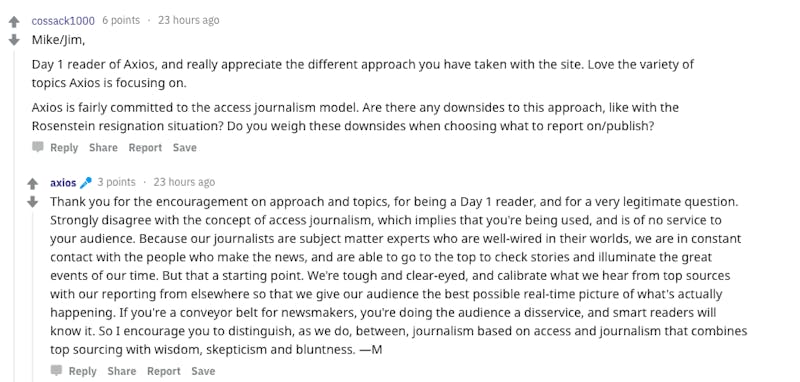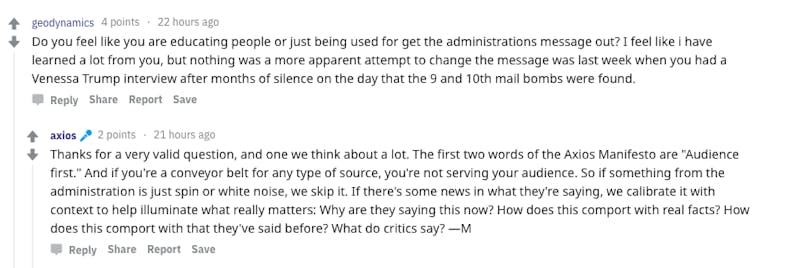Earlier this week, the scoop factory Axios made news when its star political reporter, Jonathan Swan, gleefully disseminated a clip of President Donald Trump saying he might terminate birthright citizenship by executive order.
Swan beamed as Trump applauded him for knowing about the plan before other outlets did, and he didn’t push back when Trump made the (very wrong) claim that the United States is the only country with birthright citizenship. (Swan did rightfully acknowledge that it’s “very much in dispute” that he can end birthright without a constitutional amendment.) But the fact that Trump’s plan is highly unlikely didn’t affect Axios’ decision to use their “scoop” to promote their HBO show—or include any discussion of the improbability of Trump’s plan in their initial reporting. As Splinter’s Libby Watson wrote on Tuesday, it was a moment that encapsulated a news outlet that privileged a smug sense of being “in the know” over meaningful reporting.
This snafu was very much on the brain of Reddit users when Swan’s bosses, Axios founders Mike Allen and Jim VandeHei, did an AMA (Ask Me Anything) on the site on Thursday. Asked repeatedly about their organization’s commitment to access journalism, Allen and Vandehei got defensive.


These are illuminating answers. Axios was set up, in Allen and VandeHei’s formulation, as a necessary corrective. They aimed to fix a journalistic ecosystem that, as Allen says elsewhere in the AMA, “brought out some of the worst habits in journalists, and created whole news ones—carelessness, vitriol, self-absorption. And volume.” Axios, with its short articles, bullet points, and “Be Smart” analysis, was meant to cut through the “noise” like a scythe. And they do it all for their readers.
Allen and VandeHei characterize their approach to journalism almost as if it were a scientific process: First, they talk to officials. Second, they identify what’s newsworthy. Third, they contextualize that information, so their readers know exactly what’s going on. But that description fits most political news outlets, including the one from which Allen and VandeHei came. They’re making Axios seem radical, when really it’s the same scoop-obsessed, insider-y journalism they perfected at Politico, just briefer.
Allen and VandeHei are right in the AMA to push back at accusations that they engage in access journalism explicitly for quid pro quo reasons—that they publicize scooplets for politicians in exchange for eyeballs. As the saga with Swan shows, however, the shiny object of the scoop outweighs everything else. Thus, in the above clip, Trump is largely unchallenged in floating a plan that Republican leaders—and even Steve Bannon—consider too dicey, and one which clearly is a cynical voter turnout tactic.
That’s real context, but not what Axios regularly provides. Instead, its highly respected readers have the news spoon-fed to them in bullet points, with kickers such as, “Momentum matters—in sports, in love and in politics. Momentum is all against the GOP.”